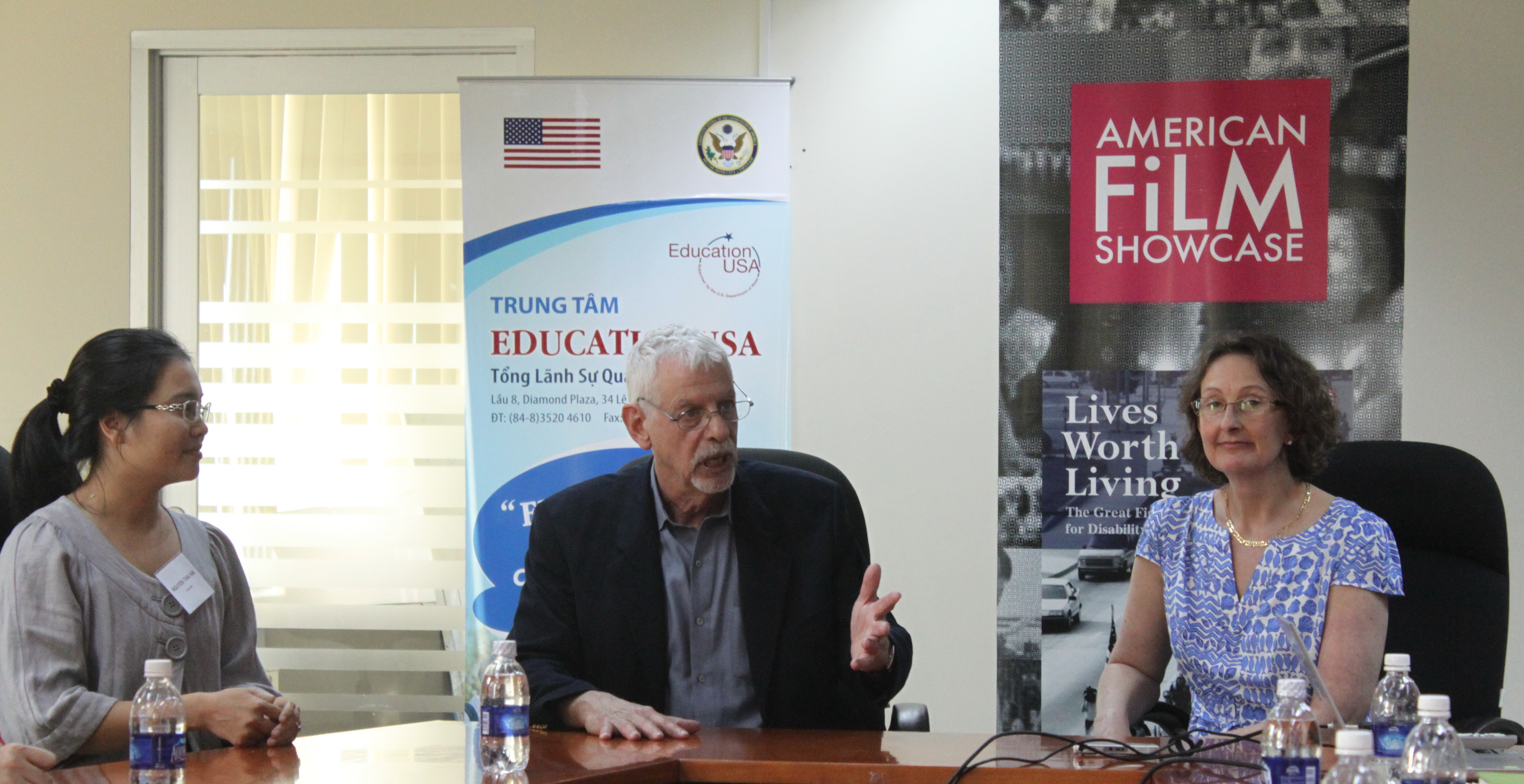It is their sympathy for people with disabilities that drove American director Eric Neudel and his wife Alison Gilkey to make “Lives Worth Living,” a documentary about physically challenged people, they told Tuoitrenews in an interview last week.
The film received the 2011 National Broadcast through PBS’s Independent Lens Series award.
Eric Neudel and his wife Alison Gilkey were interviewed by Tuoitrenews about their passion for disabled people when they came to Vietnam to talk about the film and their filmmaking experience with Vietnamese audiences at the U.S Consulate’s American Center in Ho Chi Minh City on March 13.
People with disabilities are never seen as an interesting and attractive topic. Why did you decide to make this film?
Eric Neudel: When we said we wanted to make a film about the history of the disability rights movement and tried to finance it, everybody thought it would be a really boring and uninteresting film. However, we knew this would be a really good film because no one else believed in it. There was no history and no coverage of this really important part of American history.
Alison Gilkey: We were going through years of research for the film and started out with one idea that we would make the film about Fred Fay [a film character]. We knew that Fred’s is a story that had not been told; Fred is a fascinating guy and that story itself would have been fascinating for anybody to watch. We realized through our research that the disabled population is the biggest minority in the U.S., with around 60 million people living with disabilities, and the fight for their rights is as important as the civil rights movement and the fight for women’s rights and LGBT rights.
How did you attract the public’s attention?
Eric Neudel: We knew this was a great story, that people would watch it and understand something brand new about the history of civil rights. That was really important to us as we are really interested in civil rights, which is the mechanism for achieving equality. We knew this story was good because first of all no one had paid any attention to this story. Secondly, this was one of the two greatest civil rights acts in American history. Two laws passed in the 20th century changed the U.S. into a better place; the first was in 1964 for African Americans, and the second was for disabled people.
What did you do to earn the trust of people with disabilities?
Eric Neudel: The short answer is “time.” You should spend time with the people you film. When we interviewed our characters in the film, we studied them, each one of them for about a week, maybe two weeks; we learned as many things as we could about their lives. Sometimes we knew more about them than they could remember about themselves. Sometimes I talked to people on the phone for months so they could open up. Alison was especially good at this, especially with some very difficult subjects because they were very resistant to talk about anything at all, even to talk to us. She slowly but surely got close to them in a way they responded to. Sometimes it took about a month; in one case it took six months.
What are some difficulties that you faced when making this film?
Eric Neudel: This is a very difficult film because most of the people that we wanted to deal with were getting very old and were thus a vulnerable group. People with disabilities sometimes don’t live as long as able-bodied people. So we faced a lot of pressure to film people while they were healthy. Since we finished the film [in mid-2011], four of our subjects have died. One of them died during the film. I interviewed a woman in October 2010 and she died in January 2011, before we finished the film. She was very ill at that time. The biggest challenge was to get all the voices that were necessary for the film.
Another issue is that we wanted to reflect all the different kinds of disabilities because sometimes people think just those in wheelchairs or who are deaf are considered disabled. However, there is a much bigger spectrum of disabilities: people with autism and mental illness, for example. Therefore, we wanted to include as many different people from different groups as we could. When it came to people with disabilities, they had not had a good opportunity to speak for themselves, to have their own voice be heard, so our idea was that they should speak for themselves and we would not have anyone narrate the film.
Moreover, we needed actions and motion in the film, and most of the motions that were available to us were from protests in the past. But finding recordings of these events was very difficult, as much of the footage has been destroyed.
Alison Gilkey: We needed to reassure some of the people we interviewed that we were not going to tell a story of pity, that we were going to let people use their voices to tell their story and we were just going to put it together. So, people allowed us to go through their personal belongings, into their basements, garages, to go through boxes to find all of their photographs and footage.
| Eric Neudel has produced, directed and edited numerous award-winning films for the public television Public Broadcasting Service (PSB), including Eyes on the Prize; AIDS: Chapter One; After the Crash; The Philippines and The U.S.: In Our Image, Body and Soul. His wife, Alison Gilkey, was the co-producer and co-director of the documentary “Lives Worth Living.” Alison is making another version of this film which will be used for teaching purposes in high school in the U.S. |


















































